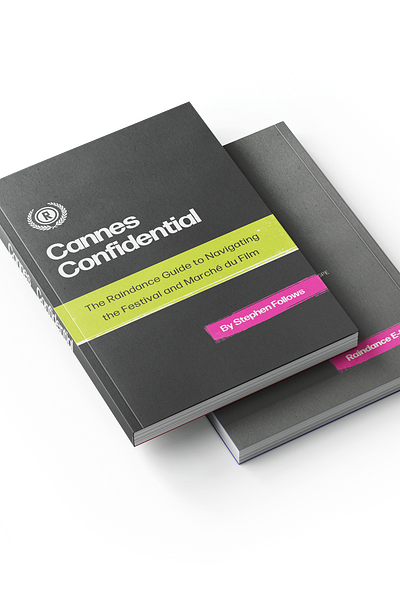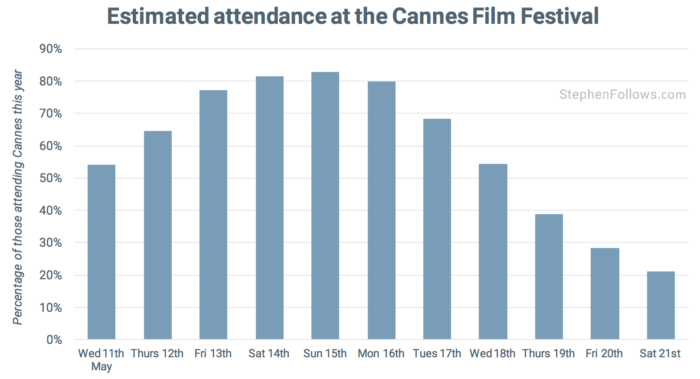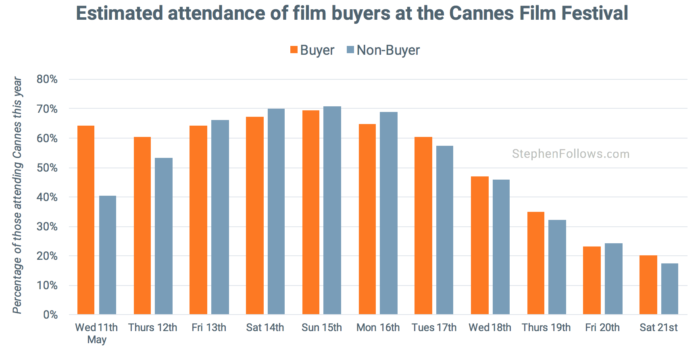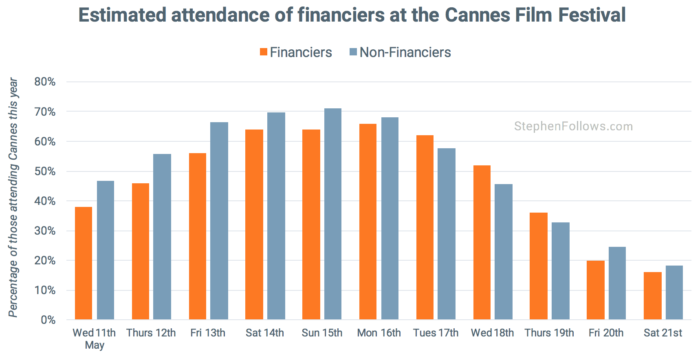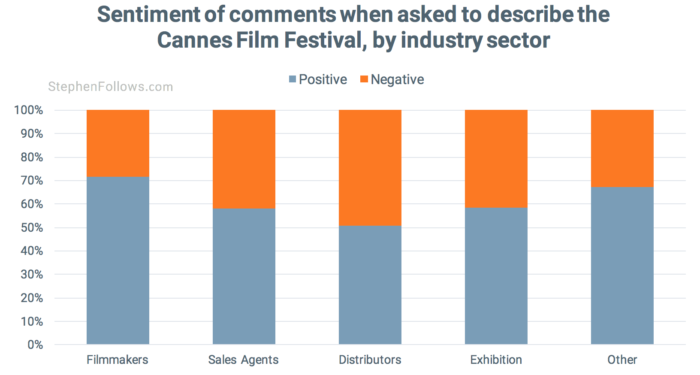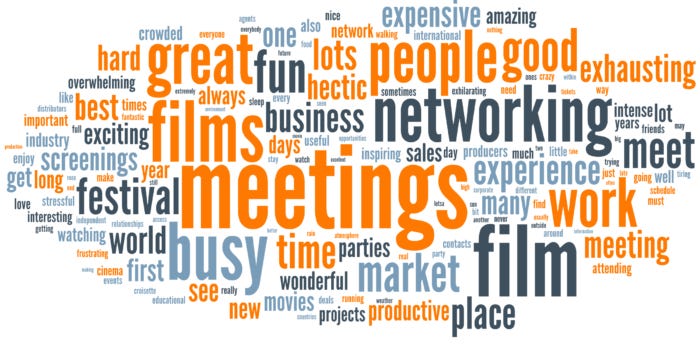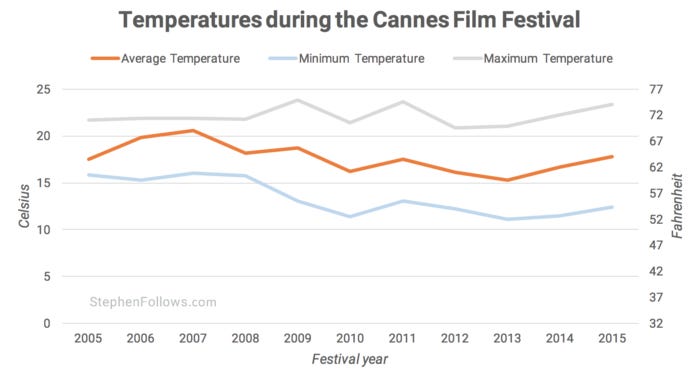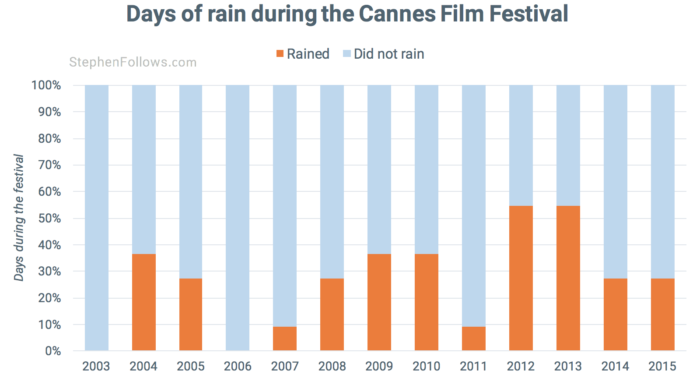Ultimate tips for attending the Cannes Film Festival
Everything you need to know to make the most of your Cannes experience – from screenings to soirées.
Here is a 36-page guide I wrote for Raindance on how to best navigate the Cannes Film Festival and Marché du Film. Download your free copy below:
The Cannes Film Festival and market are the highlights of the film calendar each year, with an epic number of events, screenings, parties and meetings crammed into a little French town over the course of eleven days. To give Cannes first-timers a few pointers, over the past few years, I have contacted a large number of Cannes Film Festival veterans.
In the end, 575 film professionals gave their advice, with a combined experience of 4,478 trips to the Cannes film festival. In addition, I ran a few research projects to look at what the data and statistics can tell us about how to do Cannes right.
I'm grateful to everyone who took the time to share their thoughts, advice and tips.
Tip #1: Be there over the first weekend
I asked my respondents when they were planning to attend, and the results showed that the first weekend is the busiest.
It seems that over 80% of those attending the festival at any point will be there on the first Sunday. This is a pattern which repeats every year.
Tip #2: Buyers prefer the first few days
A major reason professionals attend the Cannes market is to sell distribution rights for their film(s). These rights are bought by a small number of attendees who have the official 'Buyer' classifications, usually illustrated via a purple stripe on their market pass.
As time in Cannes is short, producers and sales agents do all they can to reach buyers.
And the data suggests that one thing they can do is ensure that they're attending right from the opening of the market at 9am on the first day, when the ratio of buyers to attendees is at its most favourable.
Tip #3: Financiers arrive later
By contrast, those primarily going to the Cannes film festival to find projects to finance tend to arrive later. The most favourable financier-to-attendee ratios are to be found on the three days after the first weekend.
Tip #4: Learn the lingo
Spend some time ahead of your trip getting familiar with some of the terms people use in Cannes conversations. Here are a few to get you started:
The Palais - Short for Palais des Festivals, this is the main venue where the official screenings and red carpets happen.
The Marché - The film market, short for Marché du Film. It’s where deals are made and meetings happen. Most industry folk spend more time here than at the premieres.
Badges - Your badge tells people who you are and what level of access you have. Colour matters. Some doors open only for certain colours.
Quinzaine – Short for Directors’ Fortnight, an independent section that runs alongside the official selection. Cool films, emerging directors, and a more relaxed vibe.
La Plage - Literally "the beach", but often used to refer to specific branded beach venues (e.g., Plage des Palmes, or the UK Film Centre beach). A meeting “on the beach” might not involve sunbathing.
Terrasse meetings - Catching up at one of the cafes with a view of the sea. Often informal, always strategic.
Bumper - A short animated sponsor sequence shown before a film. Industry folk may complain about “too many bumpers” before a screening.
Raclette - Not the cheese. It’s the name of the badge scanner used to check your access before a screening. “I got raclette’d” = denied entry.
The List - Some parties, events, or dinners need you to be “on the list”. And even then, it’s no guarantee.
Yachting - Yes, people really do take meetings on boats. Don’t be surprised if your 3pm is “aboard.”
Tip #5: Filmmakers have fun, Distributors don't
By examining the sentiment of respondents' comments, I can examine how various sectors of the film industry feel about the festival.
Filmmakers have the best things to say about Cannes, with almost three-quarters providing only positive feedback. By contrast, half of those working in distribution said positive things, while the other half were entirely negative.
Tip #6: Expect the unexpected
Here are some of the ways my respondents summed up the Cannes film festival...
A maelstrom of sleep-deprived business.
Hysterical, overrated, unfriendly environment.
The single greatest networking event on the planet.
The world championship for collective humiliation.
Digging through a skip of muck trying to find a diamond ring.
Alcohol, vapid film chat, alcohol, loads of business cards, surreal experiences.
Stressful, fun, exhausting, lots of late nights, lots of time wasters and deluded indie film types.
Over 100 scheduled meetings, a couple of hundred brief encounters, lots of preparations of lots of homework to do after.
Some descriptions of the Cannes film festival were rather more poetic...
I always describe Cannes as 10 days of Friday nights and Monday mornings.
You rarely get to bed before midnight/1am but still have to be up and at 'em at 8am the next morning.
Days are spent running up and down the croisette multiple times, meeting with sales agents, devouring the trades, queuing for screenings, watching a plethora of either barely watchable films or films you love but 'aren't commercial enough', elbowing your way into the Palais, arguing with officials, dodging tourists and all the while hoping you're going to find that one gem that will make the mad expense of attending the festival worthwhile.
Days generally end with a glass of Rose on the beach comparing notes with colleagues as the sun goes down. In a nutshell - the busy, boozy, sleep-deprived business of film.
Tip #7: Planning precedes parties
There are three sides to Cannes - the screenings, the business and the parties. Although they each have their own ecosystems, they all require careful planning and preparation.
In recent years, Telegram groups and WhatsApp threads have overtaken public listings, making access even more dependent on who you know. Some party invites are distributed through Cinando or Eventbrite, while others are shared via PDFs passed quietly among attendees. If you're lucky, your national film body or sales agent might have a list. If not, keep your ear to the ground and befriend someone who does.
Most of the big events are private and require invitations, but a surprising number are technically open – if you know the time, the venue and what to say at the door. Many parties don’t advertise a guest list but still turn people away if they don’t look the part or arrive too late. Lines can stretch down the Croisette, especially in the first weekend when demand is highest.
Venues vary widely – rooftop bars, beach clubs, hotel terraces, private villas and yachts. Some hosts throw invite-only dinners, followed by open dance floors later in the evening. Others keep it tight all night. Knowing when to show up (often early to network, later to drink) is part of the game.
The more effort you put into planning and networking in advance, the more likely you’ll avoid the classic rookie mistake: standing outside a party you heard about five minutes ago, in the wrong shoes, with no name on the list.
Tip #8: Learn the art of the blag
Naturally, the more popular a party is, the harder it will be to get invited. So what can you do if you're without a ticket but want to get it in? Here are some tips from my own experience and from my respondents...
Ask. The first port of call should be to politely approach the hosting organisation and ask if they have any tickets available. Nine times out of ten you'll be turned away, but it's worth the few minutes it'll take.
Network. Talking to people around the festival can tip you off to which parties are upcoming and sometimes it can lead to actual invites. If you manage to befriend someone higher on the pecking order then the tickets they want to offload could be the very ones you're keen to get into.
Make yourself appear attractive / valuable / important to the hosts. Hosting a party in Cannes is not cheap and the hosting organisation won't want to waste tickets on people they don't see as valuable to their aims. So, if you're after a ticket to the party of a national film commission then consider approaching the commission earlier in the festival with lots of questions about shooting in their country.
Use LinkedIn & Cinando. By identifying key people within the hosting organisation you can target your networking efforts on the people most likely to get you tickets.
Dress to the nines and walk up to the door. In my early years at Cannes I was always amazed just how far a tux will get you, if you act like you lost your ticket. If you can affect an air of entitlement and self-importance then all the better. As one of my respondents put it... "The French still have class systems ingrained in their culture so act and look like you belong".
Bribe bouncers. This is news to me but enough of my respondents mentioned it so I feel I should add it to this list.
Shamelessly lie, blag and beg. If you have nothing to lose and a strong constitution, you could try something more deceitful. Obviously I disapprove of all of these, but here are some things I've heard others do...
Use the name of a journalist or reviewer. They are usually on the list, but they are too busy to attend during the first weekend. (Remember to hide your festival badge!)
Pretend you're on live TV. Dress smart, hold a microphone with the logo of a well known press organisation, narrate what you're doing to some unseen camera in the middle distance and walk confidently into the event. If you're stopped, act embarrassed and handle it the way a journalist on live TV would.
Dress like a waiter and look for a back entrance.
Search EventBrite. Some organisations use events site EventBrite to handle their RSVPs. Have a search and see if you can RSVP to events you weren't invited too.
I feel it incumbent on me to point out that no matter how good you are at blagging, the majority of times you try to enter an event without a ticket will end in disappointment. Being found out and / or turned away can feel pretty crappy and doesn't make you look too good to those nearby. That said, it's an important part of the Cannes experience and so if it's your first time at the Cannes film festival then you should try it at least a couple of times.
Tip #9: Network, network, network
One of the best things about the festival is that it brings together film professionals from all over the world. For just over a week, almost anyone who's anyone in film is hanging out in the same buildings. A few quick and dirty networking tips...
Business cards are still a must – but they’ve evolved. Keep a stash of physical cards with some white space (non-glossy) so people can jot down where they met you or what you discussed. At the same time, be ready for digital swaps: QR codes, LinkedIn links, or digital business card apps like HiHello and Blinq are becoming common, especially among younger attendees. The smartest networkers offer both – handing over a physical card while saying “scan me here too.”
Talk to anyone and everyone. this includes when you're in queues, sharing tables or just standing next to each other for a moment. You never know which relationships will be useful or enjoyable.
Keep it brief. It's much better to meet six people for ten minutes apiece than to spend an hour talking to one person. You want to expand your network and they will also want to keep working the room.
Keep meeting new people. If you're there for more than a few days there will be a temptation to spend the second half of your trip with the people you met in the first half. Resist this and seek to keep expanding your circle.
Follow up. After the festival, email everyone you've met and try to extend and expand the brief meeting into an ongoing connection.
One of the legendary Cannes film festival hangouts is the Petit Majestic - a place that defies explanation and logic. It's a backstreet in Cannes which has dirty plastic white chairs and tables and is crowded and loud all night. Sounds appalling, right? Despite this inauspicious description it's a vital part of the Cannes grapevine. It's where people go before they head off to their events, it's where they return to once they event is over (or if they got turned away) and it's where people go when no other place will have them.
Many first-timers hear about the Petit Majestic but fail to find it (or worse, find it once and never again). So here's the address: Bar Majestic, 6 Rue Tony Allard, 06400 Cannes, although it's probably easier to just remember that it's 'behind The Grand'.
Tip #10: Set up your meetings in advance
The popular press may portray the Cannes film festival as a place where everyone is at film screenings but the truth is slightly more mundane. When I asked my respondents what Cannes meant to them, networking and meeting people ranked higher than watching films.
Cannes meetings are often short (typically under 20 minutes), frantic and more about meeting people than negotiating the finer points of complicated deals. There will be time after Cannes to discuss the smallprint so during the festival it's more about getting to know each other.
Many meetings are arranged in advance, and the busiest folk will have their diaries fully booked before the festival even opens.
Below is a word cloud showing the words used by my respondents when asked what the Cannes film festival meant to them (the most frequently used words appear the largest).
Tip #11: Visit all the pavilions, not just your native one
The International Village is a long line of tents and pavilions along the beach, most representing national film commissions of countries around the world. They provide support for native filmmakers and advice for foreigners considering filming in their country. Almost all the pavilions are open to Cannes film festival attendees, so it pays to have a look around the International Village early in your trip to get your bearings.
British attendees are notorious for spending their entire trip inside the UK tent with other Brits who work in the same postcode as each other. As one respondent put it...
Skip the UK Film area as the English in particular are a rather insular bunch
The one exception to the open-pavilion rule is the American Pavilion which charges between $150 and $900 for access, depending on which benefits you want to pay for. 39% of the people who bought AmPav membership in 2014 have an annual income over $200,000 (and interestingly only 57% were American).
Tip #12: Wear comfortable shoes (but not at night)
You'll be walking around a lot, so if you're not wearing something comfortable then it won't take long for your feet to start to ache. The dress code during the day in Cannes is quite relaxed, with everyone acknowledging that it's hot, tiring and you have meetings all day. As the sun sets and the parties begin, the dress code changes. Comfort is out and glamour is in.
Last year the press gleefully reported that women were being turned away from red carpet screenings for wearing flat shoes. The festival later denied that this happened, but it's certainly true to say that guests at the 7pm and 10pm festival screenings are expected to be in their finest. The official guidance says...
Black tie/evening dress is required for gala screenings. For all other screenings appropriate smart dress is sufficient.
Tip #13: Be smart about where you stay
The town of Cannes is a pretty small place, with a permanent population of around 74,000 people. The festival draws so many people that the population almost triples to a peak of 210,000 people. Interestingly, only 32,000 are accredited attendees and 5,000 are accredited journalists, meaning that over 100,000 of the people in Cannes during the festival are waiters, security guards, tourists, pickpockets and hookers.
This inevitably puts a strain on the accommodation options, which leads to exorbitant rates. The best places are snatched up pretty early and a number of my respondents said they booked as much as six months ahead.
Airbnb. A huge number of festival attendees use Airbnb to connect with locals who are letting out their homes (despite the French authorities fining French tenants for doing just this). The apartment I'm staying in this year is costing me just over three and a half times the pre-festival cost. (If a listing looks reasonably-priced then check with the lister whether that price actually applies for the festival dates).
Hotels. A room in The Grand will set you back €980 per night during the festival (the same room a week earlier is half the price). Likewise, staying in a standard room at The Majestic during the festival currently costs €815 per night, whereas in the week before the festival it's just €205 per night. This is for a number of reasons; high demand, the sheer number of more-money-than-sense festival attendees and because some sales agents hire hotel rooms instead of having a stand in the Marche.
Staying out of town. Prices are much more reasonable in hotels and apartments in neighboring towns such as Cannes la Bocca, Antibes, St. Raphael or Juan-les-Pins. The French rail service is impressive (by British standards) so have a look at towns that are one or two stops away from the Cannes line. Be careful if you're a nightowl as you may be forced to either get an expensive taxi or wait for the trains to start again in the morning.
Camping. It's not very glamourous but there are a number of campsites near to Cannes and they start from as little as €20 per night.
Boat. If you're super rich then you may wish to consider hiring a yacht (or taking one of your own), either mooring it on the Cannes marina or in the bay.
Tip #14: Travel to match your budget
During the day, the vast majority of travel is achieved on foot as the Palais, cinemas, hotels and pavilions are all close by. The nightlife is a little more spread out, meaning you may need to use a taxi or one of the hotel shuttle buses. Traveling to and from Cannes, however, takes a little bit more planning.
Planes. Most people fly into Nice airport, although there is a private airport in Cannes itself. The full list of carriers which fly to Nice are... British Airways, Jet2, Danish Air Transport, easyJet, Monarch, Air France, Iberia, Luxair, KLM, Norwegian, Blue Air, Lufthansa, Aer Lingus, germanwings, Flybe, TAP Portugal, LOT, Vueling Airlines, Austrian Airlines, Finnair, Swiss, SAS, Tunisair, Brussels Airlines, Alitalia and Primera Air. Traveling from Nice airport to Cannes can be achieved via...
Taxi. There is a taxi rank outside the airport. It's best to split the fare with other Cannes-bound folk, as the trip will cost around €70.
Bus. The number 200 bus to Antibes stops in Cannes, leaves every 15 minutes and costs just a few Euros. It does take a few hours, but it is the cheapest method.
Train. The coastal trains travel along the Riviera with beautiful views. The train station you need is called Nice St Augustin and is a 13 minute walk from the airport..
Trains. The SNCF train takes five hours from Paris and drops you in the heart of Cannes. A one way ticket from Paris to Cannes currently costs between £57 and £87.
Automobiles. Driving in Cannes is extremely hard as the streets are small and narrow, the traffic is always heavy and there is little to no parking. You could look to rent an apartment with a parking space, although this will only add to the already exorbitant accommodation cost.
Tip #15: Prepare to get sunburnt...
One of the nicest things about Cannes is that it takes place in the early summer in the south of France. As a result, it's not uncommon for people to get sunburn just running between meetings.
The average temperature during the Cannes film festival over the past decade was 17.7ºC (63.8ºF).
Tip #16: ...but also plan for rain
Over the past ten years, it has rained on 29% of festival days. The worst year of the past decade was 2012, which the Hollywood Reporter described as having a “London feel” due to the “rain, thunder and howling winds”.
Tip #17: Watch out for thieves
With so many people dressing to impress, it's no wonder that the festival is a popular target for thieves. Criminals range from everyday pickpockets right up to organised jewel thieves.
During the 2013 Cannes film festival, thieves stole £650,000 worth of jewels and just five days later a £1.6 million necklace was also pinched. A few months later, an armed robber got away with £89 million worth of gemstones from a Cannes hotel (the same hotel featured in Alfred Hitchcock's 1955 film To Catch a Thief).
Tip #18: If it's your first time, then try to experience it all
Your first Cannes trip will be the most surprising, exciting, confusing and overwhelming of all your trips to Cannes. Hopefully, the first time you go, you're there to get the lay of the land (rather than trying to sell your project on your first trip), so use this chance to experience all that Cannes has to offer. Here are a list of things I think everyone should try to do in order to have the full Cannes film festival experience...
Go to a festival screening, ideally a red carpet gala. This takes planning, perhaps trading favours for tickets and dressing up to the nines.
Walk the halls of the marche. See how films are really sold (and try not to get too depressed).
Spend some late night / early morning hours at the Petit Majestic.
Lounge in the courtyard of The Grand, watching the world go by.
Walk the entire length of the Croisette to get your bearings. Try going further along, westward to sample the quiet beaches.
Talk your way into a party you weren't invited to
Tip #19: Ask advice from Cannes film festival veterans
A common bit of advice was to chat to people who have gone before. This starts way before you get on the plane as preparation is key to get the most out of the Cannes film festival.
Thank you to everyone who shared their views with me over the past few months for this article. If you spot something wrong or missing then please do drop me a line or add a note in the comments below.
See you on the Croisette!
Epilogue
Occasionally, the quixotic way the film industry functions brings up strange questions. For example, in the research above, I referred to the people who provide finance for films. There are two possible words for these people - financers or financiers. If we are to be pedantic (and what else would we be on a blog like this?!) then the subtle difference between the definitions matter.
According to Grammarist.com...
A financer is someone who provides money for a particular undertaking. A financier is a person or organization whose business is providing, investing, or lending money. In other words, a financier makes a habit of financing, while a financer might do it only once or occasionally.
When we apply these definitions to the film industry then we have a grammatical stalemate. I would say that the vast majority of people who provide money for films would see themselves as financiers but after having invested and not made their money back they would be better described as financers.
So should I use the expectations these people hold, or the expected reality that is likely to occur?
I decided to be generous and use financier, due to the fact they have not yet lost their money. It's Schrodingers Cash, in that the money is both 'invested' and 'wasted' until you check the recoupment paperwork, at which point it's most certainly 'wasted'.



